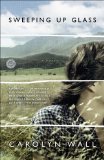Summary | Excerpt | Reading Guide | Reviews | Beyond the Book | Read-Alikes | Genres & Themes | Author Bio

Critics' Opinion:
Readers' Opinion:
First Published:
Aug 2008, 278 pages
Paperback:
Aug 2009, 336 pages
 Book Reviewed by:
Book Reviewed by:
BookBrowse First Impression Reviewers
Buy This Book
This article relates to Sweeping Up Glass
Carolyn Wall describes Sweeping Up Glass as "fifty percent truth, and fifty percent based on fact. The other fifty percent (which speaks of my math skills) is flat made-up."
When I was born, we lived over a grocery store in Toronto. My father built crates in an alley for Canada Box, and sold meat pies from the basket of his bicycle. With my mother gone off to a small private hospital for shock treatments, we moved into rooms at the top of Gramma’s house. On Sunday evenings, Dad dismantled my crib, roped it to the top of the car, and threw all the baby things in back. Then he laid me on the seat beside him and drove around Toronto, looking for an aunt and uncle to take me. In a relative’s house, he’d set up my crib and kiss me good-bye.
To help support us, and to pay the doctor and hospital bills, he worked three nights a week building radios and record players for RCA Victor. He visited my mother in the hospital and took a Wednesday-night electronics class in the back room of a Chinese restaurant.
After work on Fridays, he’d come to me, dismantle my crib, tie it to the car, toss in my stuff, and drive us home. The next Sunday night, we began again.
My poor aunts must have grown terribly weary of me, sometimes calling Dad to "come and get this kid." "No matter," he once told me. "When Gramma saw you coming, she’d open her arms wide."
Thus were born Olivia and Will’m. Writing love for grandchildren was a given, and I’m sure I’m not finished. Because I did not want to bore the reader, I wrote what I hope are unique relationships between characters. Something basic happens when two people are in a room together, even if they have not yet met. As each character’s face, name, and trouble spilled from my fingers, I knew the possibilities were endless.
If there ever is a sequel to Sweeping Up Glass, Olivia will feel deeper ties to earth, sky, and water. And, had there been an epilogue to the epilogue, surely Will’m’s connections to his mother and grandmother would have impacted the ways in which he raised his own children.
From the beginning, Olivia ached to show readers that when a thing seems to be solidly black and white, maybe it isn’t. And that moment by moment, she chose her actions and who she wanted to be. I opted for this title because, in the face of tragedy, Olivia reached for her dustpan.
As for picking Kentucky – why does any place speak to us? I wanted to set my people down in a community that was close and passionate and persecuted, and somewhere along the way I’d fallen in love with Kentucky’s mountains and their stories. In the saddest places, I saw dignity. And somewhere – I can’t remember the exact spot – I heard music.
My children and their offspring are far more to me than just my blood and bone. The real Ida gave me her creativity and stubbornness. She passed on two months after Sweeping Up Glass was sold, never knowing it existed. In its pages, I don’t think she’d have recognized herself. Still, she worked crossword puzzles in the newspaper with a pen until six weeks before she died. Not much got past her.
My father was a fine speaker. Guests would say "Put on the kettle, Frank, and tell us a story."
Making up tales – for which I was spanked as a child – is now the axis on which my world turns. May that happen to us all.
![]() This article relates to Sweeping Up Glass.
It first ran in the August 12, 2009
issue of BookBrowse Recommends.
This article relates to Sweeping Up Glass.
It first ran in the August 12, 2009
issue of BookBrowse Recommends.





The House on Biscayne Bay
by Chanel Cleeton
As death stalks a gothic mansion in Miami, the lives of two women intertwine as the past and present collide.

The Flower Sisters
by Michelle Collins Anderson
From the new Fannie Flagg of the Ozarks, a richly-woven story of family, forgiveness, and reinvention.

The Funeral Cryer by Wenyan Lu
Debut novelist Wenyan Lu brings us this witty yet profound story about one woman's midlife reawakening in contemporary rural China.
Your guide toexceptional books
BookBrowse seeks out and recommends the best in contemporary fiction and nonfiction—books that not only engage and entertain but also deepen our understanding of ourselves and the world around us.